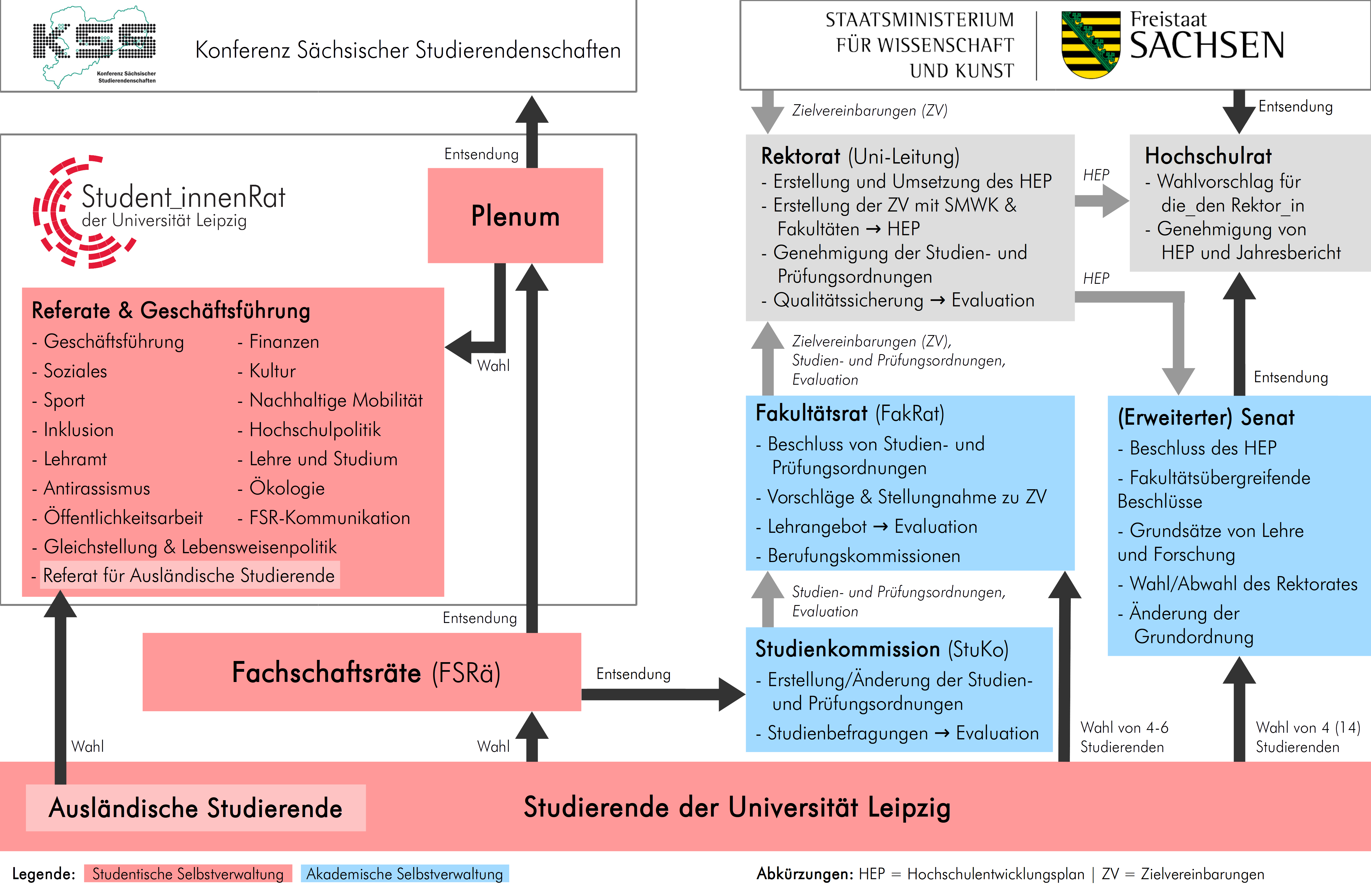What is up for election?
Democracy is all well and good, but why so many different committees and what do they actually do?
In order to clear up the jungle of committees, it helps to first divide the committees into two pillars:
- The student committees: They consist entirely of student members and, in accordance with the Higher Education Act, look after the political and social interests of the students (= student self-administration).
- The university committees: In addition to the student representatives, the other member groups of the university are always represented here: The university teachers, who represent the majority of one vote, the academic and the other employees. They take care of everything concerning the planning of research and teaching (= academic self-administration).
Here you can find the most important committees, separated according to the two pillars, with their tasks:
Student Committees
The committees of the student self-administration consist only of students and deal with student concerns. In addition to the directly electable bodies, there are some indirectly elected bodies. The Student Council, for example, is made up of representatives from all Fachschaftsräte.
University Committees
The bodies of academic self-administration at university level are the Senate and the Extended Senate. At the faculty level, there are the faculty councils and the equal opportunity commissioners. In most cases, there are also smaller bodies in the individual institutes, such as institute councils, examination boards and study commissions. However, the student members in these institute- or study program-related committees are indirectly elected by the faculty councils on the recommendation of the student councils.
The university’s election office is responsible for elections to these bodies.
Fachschaftsrat
The Fachschaftsrat or FSR consists of 4 to 15 elected representatives. They are the direct contact persons for all problems in your field of study:
Whether it’s difficulties with lecturers, exams, or requests for improvements in your studies as a whole, your FSR represents your interests vis-à-vis the faculty and in various committees.
In addition, the student councils organize a wide range of events, from information evenings on various topics to film evenings and sports events. Many student councils also support external student projects and initiatives, or run an FSR store.
The elected members usually meet once a week for public meetings. Just drop by your FSR, it’s a great way to get to know your department from another side or to network with other students!
The FSRä welcome your cooperation, ideas, criticism and praise for their work. A list of the 32 student representatives with links to their own websites can be found here.
Faculty Council
What the Senate is at the university-wide level, the Faculty Councils are at the level of the 14 faculties:
They take care of all faculty matters. They plan the courses of study, decide on the study and examination regulations that define the framework and content of the courses of study, they participate in the appointment of new professors and have a say in the development and structural planning of the faculty.
Because of the great importance of the faculty councils for the study program, student representation is especially important here! Depending on the size of the faculty council, you can appoint two to six representatives. The student members have a veto right for all questions of study organization, which can only be overruled with a two-thirds majority.
For information about the activities in your faculty council and possible candidates, please contact your student council!
Foreign Students Unit
The RAS (Referat Ausländischer Studierender) represents the interests of foreign students and organizes events and counseling services.
You can find out more about its activities on the RAS pages.
Senate
The Senate is the highest decision-making body of the University. It consists of a total of 21 senators, 4 of whom are students. The most important tasks are the election of the vice-rectors, the resolution of the development plan of the university and the enactment of regulations for the quality assurance of the courses. In addition, it is the most important communication body between students and the rectorate, especially with regard to changes in the structures. In other words, everything that directly affects teaching at the university as a whole is discussed by the Senate.
More information can be found on the page of the student members of the senate on the StuRa website.
Extended Senate
When it comes to the constitution (quasi the constitution of the university) or every five years to the election of the rector of the university, the 21 senators are joined by 70 other elected representatives, 14 of whom are students.
PhD Council
As a body of the university, the PhD Council, or ProRat for short, represents all doctoral students and advocates for their interests. The tasks of the ProRat include both the internal and external representation of the doctoral students of the UL, but in particular:
- The representation of the interests of the doctoral students, especially with regard to university policy,
- the consultation as well as individual support in all phases of the doctorate,
- the distribution of information and the organization of further education for doctoral students as well as
- the networking of doctoral students, both interdisciplinary and with other universities.
https://www.prorat.uni-leipzig.de/
Equal Opportunity Officer
Each faculty elects an equal opportunity officer and a deputy. Students are elected for one year. The scope of duties includes all issues concerning gender equality, as well as the development of measures and projects for the implementation of equal opportunities.
In this function, the Equal Opportunity Officer is an advisory member in appointment committees and a voting member in the Faculty Council. The equal opportunity officers of the faculties usually meet on a monthly basis. Twice a year, a joint meeting of the members of the Equal Opportunity Committee and the Equal Opportunity Council takes place.
